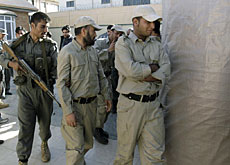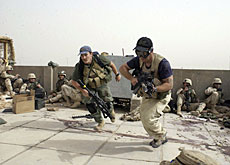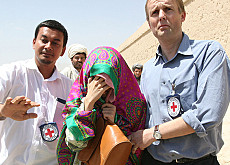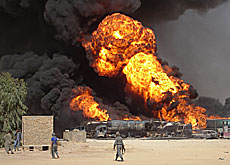Study criticises security firms in Afghanistan

Private security contractors in Afghanistan add to the sense of insecurity and are often confused with foreign troops, according to an independent Swiss study.
The main problem is that “nobody guards the guardians”, says Susanne Schmeidl, co-author of “Private Security Companies and Local Populations: An exploratory study of Afghanistan and Angola”.
The report, published on Monday by swisspeace, a Bern-based peace research institute, said the number of private security companies had risen steadily since US-led and Afghan forces overthrew the Taliban in 2001.
They are often charged with guarding homes and offices in cities and supply convoys and construction projects in the countryside.
The Afghan government has failed to introduce proper legislation or regulations to govern the private security companies, but the police have nevertheless begun a crackdown on those operating without a temporary licence, according to the report.
Some of the companies are Afghan-owned. The main country of origin among the foreign-owned companies are the United States followed by Britain.
Private security firms represent a new form of mercenary activity, a United Nations report said last week. The firms have come under increased scrutiny since guards working for the US company Blackwater were accused of killing 17 Iraqis in Baghdad in September.
Last week it was revealed that Switzerland’s military justice was investigating a Swiss citizen who worked for Blackwater in Iraq.
The authorities were looking into whether the man broke a law that bars Swiss people from working for foreign military services.
Confusion
While there have been no such incidents in Afghanistan, some ordinary Afghans interviewed by Schmeidl complained that some security contractors behaved in a “cowboy-like” way and did not treat Afghans with respect.
The presence of so many armed men, often from different groups operating in close vicinity to one another, added to residents’ sense of insecurity, she found.
“Many Afghans are not able to distinguish the private security sector from the international armed forces, or from their own Afghan National Police and Afghan army and general confusion prevails,” Schmeidl told a news conference in Kabul.
“Inside jobs”
Schmeidl added that security companies often hire former Afghan militiamen either as individuals or in some cases as a group along with their local warlord commander.
“While there is a positive argument to be made that private security company employment keeps former strongmen and their militia off the streets… the dilemma as to what will happen to these militia when the contract ends needs to be addressed,” she said.
Afghans perceived private security companies to be involved in crime, and the robbing of several Kabul banks – thought to be “inside jobs” – prompted President Hamid Karzai to try to speed up legislation for the sector, which has languished in parliament.
Police have raided the offices of up to ten, mostly Afghan, security companies in the past month and have vowed to crack down on all those without temporary licences.
“Companies operating against the law are a threat and are creating a challenge for security forces in the country so they must be eliminated,” said interior ministry spokesman Zemarai Bashary.
swissinfo with agencies
Private security companies (PSCs) began to enter Afghanistan after the US-led invasion of the country in 2001. So far, a mix of local and international security companies are active in Afghanistan.
The swisspeace report says 18,500-28,000 individuals are assumed to be employed in this sector, offering a wide range of services, including the guarding of people and sites, training, or logistics support for military operations.
swisspeace is a Bern-based peace research institute in the area of conflict analysis and peace building.
It researches the causes of wars and violent conflicts, develops tools for early recognition of tensions, and formulates conflict mitigation and peace-building strategies.
swisspeace was founded in 1988 as the Swiss Peace Foundation with the goal of promoting independent peace research in Switzerland.
Today swisspeace engages about 40 staff members. Its most important clients are the Swiss foreign ministry and the Swiss National Science Foundation, as well as national and international organisations and foundations.

In compliance with the JTI standards
More: SWI swissinfo.ch certified by the Journalism Trust Initiative



You can find an overview of ongoing debates with our journalists here. Please join us!
If you want to start a conversation about a topic raised in this article or want to report factual errors, email us at english@swissinfo.ch.